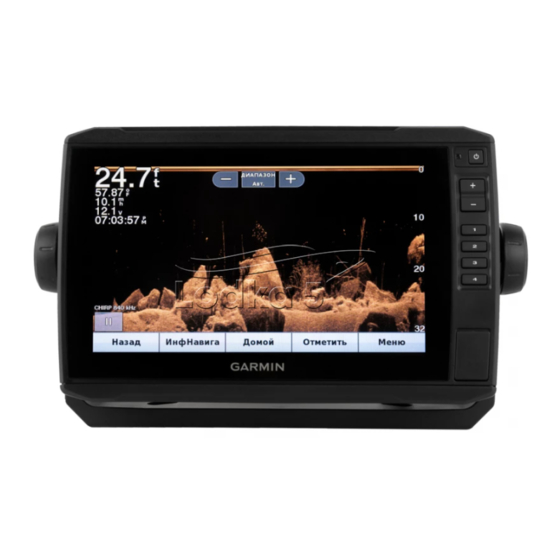Garmin echomap 90 series Manual del usuario - Página 20
Navegue en línea o descargue pdf Manual del usuario para Sistema GPS marino Garmin echomap 90 series. Garmin echomap 90 series 30 páginas.
También para Garmin echomap 90 series: Instrucciones de instalación (4 páginas), Instrucciones de instalación (4 páginas), Manual del usuario (50 páginas)

appearance of noise near the surface. When the value of this
setting is increased, the colors associated with low-level
noise and fish targets appear more consistent through
various water depths. This setting also reduces the noise
near the surface of the water.
Sonar Installation Settings
NOTE: Not all options and settings apply to all models and
transducers.
From a sonar view, select MENU > Sonar Setup > Installation.
Restore Sonar Defaults: Restores the factory default settings
for the sonar view.
Transducer Type: Allows you to select the type of transducer
that is connected to the device.
Shift: Allows you to set the depth range on which the sonar is
focused. This enables you to zoom in to an area within the
focused depth.
Flip Left/Right: Changes the orientation of the SideVü sonar
view when the transducer is installed backward.
Sonar Alarm Settings
NOTE: Some settings require external accessories.
Select Settings > Alarms > Sonar.
Shallow Water: Sets an alarm to sound when the depth is less
than the specified value.
Deep Water: Sets an alarm to sound when the depth is greater
than the specified value.
Water Temp.: Sets an alarm to sound when the transducer
reports a temperature that is 2°F (1.1°C) above or below the
specified temperature.
Fish: Sets an alarm to sound when the device detects a
suspended target.
•
sets the alarm to sound when fish of all sizes are
detected.
•
sets the alarm to sound only when medium or large
fish are detected.
•
sets the alarm to sound only when large fish are
detected.
Sonar Recordings
Recording the Sonar Display
NOTE: Not all models support sonar recording.
1
Insert a memory card into the card slot.
2
From a sonar view, select MENU > Sonar Recording >
Record Sonar.
15 minutes of sonar recording uses approximately 200 MB of
space of the inserted memory card. You can record sonar
until the card reaches capacity.
Stopping the Sonar Recording
Before you can stop recording the sonar, you must begin
recording it
(Recording the Sonar
From a sonar view, select MENU > Sonar Recording > Stop
Recording.
Deleting a Sonar Recording
1
Insert a memory card into the card slot.
2
Select Sonar > Sonar Recordings > View Recordings.
3
Select a recording.
4
Select Delete.
Playing Sonar Recordings
Before you can play back the sonar recordings, you must
download and install the HomePort
sonar data onto a memory card.
16
Display).
™
application and record
1
Remove the memory card from the device.
2
Insert the memory card into a card reader attached to a
computer.
3
Open the HomePort application.
4
Select a sonar recording from your device list.
5
Right-click the sonar recording in the lower pane.
6
Select Playback.
Gauges and Almanac Data
Gauges provide various information about the trip, environment,
and wind. Some data requires connection to compatible
sensors.
The chartplotters also provide almanac information about tides,
currents, and the sun and moon, such as rise and set times.
Viewing the Compass
You can view information about your bearing, heading, and
route using the compass.
Select Navigation Info > Compass.
Viewing Trip Gauges
Trip gauges show information for odometer, speed, time, and
fuel for your present trip.
Select Navigation Info > Trip.
Resetting Trip Gauges
1
Select Navigation Info > Trip & Graphs > Trip.
2
Select an option:
• To set all the readings for the present trip to zero, select
Reset Trip.
• To set the maximum speed reading to zero, select Reset
Maximum Speed.
• To set the odometer reading to zero, select Reset
Odometer.
• To set all the readings to zero, select Reset All.
Tide, Current, and Celestial Information
Tide Station Information
You can view information about a tide station for a specific date
and time, including the tide height, and when the next high and
low tides will occur. By default, the chartplotter shows tide
information for the most recently viewed tide station and for the
present date and time.
Select Navigation Info > Tides & Currents > Tides.
Current Station Information
NOTE: Current station information is available with certain
detailed maps.
You can view information about a current station for a specific
date and time, including the current speed and level of the
current. By default, the chartplotter shows current information for
the most recently viewed current station and for the present date
and time.
Select Navigation Info > Tides & Currents > Currents.
Celestial Information
You can view information about sunrise, sunset, moonrise,
moonset, moon phase, and the approximate sky view location of
the sun and moon. The center of the screen represents the sky
overhead, and the outermost rings represent the horizon. By
default, the chartplotter shows celestial information for the
present date and time.
Select Navigation Info > Tides & Currents > Celestial.
Gauges and Almanac Data
